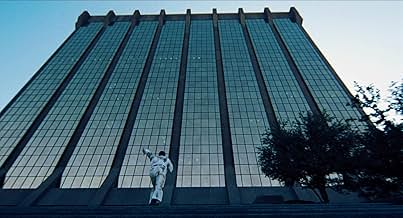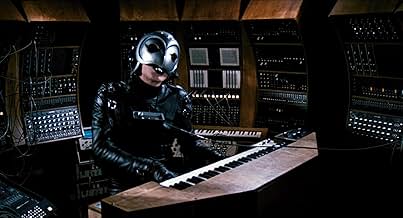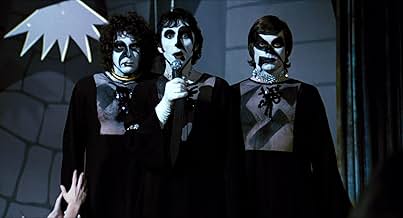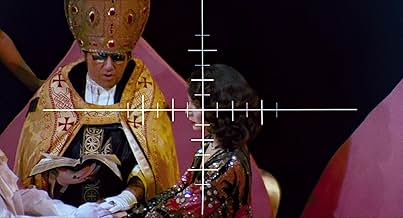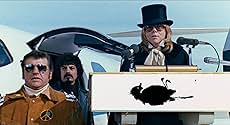Un compositore sfigurato vende la sua anima per la donna che ama, affinché eseguisse la sua musica. Tuttavia, un industriale del disco malvagio lo tradisce e ruba la sua musica per aprire il... Leggi tuttoUn compositore sfigurato vende la sua anima per la donna che ama, affinché eseguisse la sua musica. Tuttavia, un industriale del disco malvagio lo tradisce e ruba la sua musica per aprire il suo palazzo rock.Un compositore sfigurato vende la sua anima per la donna che ama, affinché eseguisse la sua musica. Tuttavia, un industriale del disco malvagio lo tradisce e ruba la sua musica per aprire il suo palazzo rock.
- Regia
- Sceneggiatura
- Star
- Candidato a 1 Oscar
- 3 vittorie e 5 candidature totali
- The Juicy Fruits
- (as Harold Oblong)
- …
Recensioni in evidenza
It's a thoroughly flamboyant, marvelously designed and decorated rock musical that combines the themes of Phantom of the Opera, Faust, and The Picture of Dorian Gray. William Finley stars as Winslow Leach, a naive, trusting singer-composer who is taken advantage of by conniving producer Swan (who's played by real-life singer-composer-actor Paul Williams). Several circumstances later, the disfigured Leach seeks revenge against Swan while falling madly in love with aspiring pop star Phoenix (the radiant Jessica Harper).
The late, great character star Finley and the engaging Williams were never better than in this funny and fast paced exercise in style. It gets off to a great start with opening narration by none other than Rod Serling. Well shot, by Larry Pizer, and designed, by Jack Fisk, it features some thoroughly catchy ditties by Williams. The parodies of such performers as Sha-Na-Na and the Beach Boys are spot on. De Palma is also most effective at capturing the insanity of the emerging shock-rock trend, especially with the effeminate rocker Beef, one of the all- time best roles for top character actor Gerrit Graham.
Harper is beautiful and extremely appealing and it's a shame that neither she nor Graham nor anyone else here ever became big stars. Williams is great fun, and Finley fully embraces the tragic arc of his character. Heavy set George Memmoli is also solid as Swans' gopher Philbin.
This film manages to maintain that feeling of fun throughout while also being rather sad at the same time.
Trivia note: Fisks' wife, actress Sissy Spacek, who went on to play the title role in De Palmas' next film, the feature adaptation of Stephen Kings' "Carrie", was the set dresser here. And look for such familiar 70s actresses as Jennifer Ashley, Janit Baldwin, Janus Blythe, Robin Mattson, Patrice Rohmer, and Cheryl Smith among the groupies.
Eight out of 10.
This is the best horror film I've seen by De Palma. While it is mostly tongue-in-cheek, it does feature one of the most suspenseful uses of his trademark "split screen." The story is great--a surprisingly clever indictment of the music industry. The music is wonderful if you like glam, though the songs that Jessica Harper (the Christine figure) sings seem out of place and are about as deadpan as her performance. Gerrit Graham is a riot as Beef and steals every scene he is in. I recommend "Phantom of the Paradise" to fans of over-the-top productions such as Rocky Horror, as well as anyone looking for a unique twist on a classic tale that doesn't take itself too seriously. My Rating: 7.5/10
Howard Maxford feels the film is "dated", and that is the best criticism one can make of the film. The songs do not hold one's attention well. The plot in general is decent, but the music -- a central focus of the movie -- is just average.
Brian de Palma, the director of "Carrie" and "Black Dahlia", is in charge here. He makes a visually appealing film, with angles and colors that call to mind Stanley Kubrick's "2001" and "A Clockwork Orange", as well as Dario Argento's "Suspiria" (which star Jessica Harper would appear in after this film).
Gerrit Graham ("TerrorVision") as Beef is great, and a nice send-up of glam rock. The critics had called the film "funny" and "hilarious", but both are exaggerations. The humor is very subtle, with this being a musical first, horror film second and comedy third.
The references to Dorian Gray are awesome, and unspoken. There are also cues from Poe and previous "Phantom" films. Some have said there is even an homage to Orson Welles' "Touch of Evil" (and I believe them, but I have not seen the film yet). Sissy Spacek is credited as a "set dresser"... you decide what that means.
Swan (Paul Williams) is a powerful and legendary music producer who is making preparations for his greatest triumph in music business: The Paradise, a monster auditorium that will serve him as palace. To inaugurate his palace, he is looking for the perfect sound and he fins it in the music of Winslow Leach (William Finley), a young composer who dreams with presenting his "Faust" cantata to the world. Swan steals Leach's work and in an accident, deforms his face turning Leach into The Phantom. Now, as the masked monster, the Phantom will try to stop Swan's plans by sabotaging the Paradise.
The movie is a visually and musically impressive rock opera with a healthy dose of horror and tongue-in-cheek humor. Brian De Palma cleverly conjures the basic outline of Leroux's novel and add elements of his other influences making the movie a subtle yet moving tribute to the books/movies/music he loves. The modernization and the change from opera to rock work surprisingly good and despite of being a bit outdated by now, the music (by Paul Williams) still makes one of the best soundtracks in a horror film.
De Palma continues improving his technique in this film and like in the previous "Sisters", his style shows maturity and a definitive trademark. Often labeled as a Hitchcock-imitator, I believe that De Palma simply likes to pay constant tribute to his influences, and this film serves a proof of that. Elements of Welles, Hitchcock, Murneau, Whale and Wienne are all over the picture, yet "Phantom of the Paradise" is like none of the works of those directors.
Paul Williams not only composed the soundtrack, he also stars as Swan, the dark and evil genius that leads Death Records and ultimately uses Leach's music for his own purposes. His performance is superb and while not physically imposing he is truly one of the best villains I've ever seen. Finley's take on the Phantom is, like most of the modern interpretations of the character, a romantic tragic figure; but Finley recovers some of the original horror characteristics of the novel creating an attractive but still menacing monster.
Jessica Harper, who would achieve fame in Dario Argento's "Suspiria", gives a good performance as Phoenix, the young singer that captures both Swan and Leach's attention. Like she would do in "Suspiria", she adds depth to the role of the naive singer who wants nothing but to triumph. Something remarkable is the fact that she sang all her songs and did it with credibility and talent. Last but not least, Gerrit Graham portrays a Bowie-inspired Glam rock diva in the unforgettable role of rock superstar Beef.
Sadly, not everything is perfect in Paradise, and neither is in this movie. The odd mixture of musical and horror works very good but at times the movie gets a bit too serious to pass as a musical or too silly to pass as a horror film. It's not a surprise that "The Rocky Horror Picture Show" gained more recognition as it keeps both genres perfectly in equilibrium in all its flamboyant runtime. Still, this is a minor flaw that keeps the movie away from perfection.
Maybe I had low expectations or maybe I was just in the right mood, but "Phantom of the Paradise" was a pleasant surprise that I would not hesitate to recommend to fans of "The Rocky Horror Picture Show" or fans of black comedy in general. 8/10
Lo sapevi?
- QuizThe record press in which the character Winslow Leach is disfigured was in fact a real pressing plant (it was an injection-molding press at an Ideal Toy Company plant). William Finley was worried about whether the machine would be safe, and the crew assured him it was. The press was fitted with foam pads (which resemble the casting molds in the press) and there were chocks put in the center to stop it from closing completely. However, the machine was powerful enough to crush the chocks that it gradually kept closing. It is commonly believed that Finley pulled his head out of the press just in time to avoid being injured, and that his scream in that scene was genuine, but this is an exaggeration. Finley was quickly pulled out by grips and the record press scene, along with most scenes in the movie with little dialogue, was filmed without sound, and the talking and sound effects were dubbed in later. At a Phantom of the Paradise convention, Finley exaggerated the story and said that his scream was "for real", although he may have meant that he was able to conjure up a very real scream in post-production by thinking back to his memories of the incident.
- BlooperVideotape was still only in the experimental development phase in 1953, when Swan records his suicide note/contract, and at that it was only capable of black and white images. Color, broadcast quality videotape of the kind depicted here was not available until the late 1950s.
- Citazioni
The Phantom: [to Beef] Never sing my music again. Not here, not anywhere. Do you understand? Never again. My music is for Phoenix. Only she can sing it. Anyone else who tries, dies!
- Curiosità sui creditiThe closing credits feature a series of montages of the cast members, identifying each by name, starting with the musical trio (Oblong, Hahn, Comanor) and concluding with William Finley as Winslow/The Phantom. These montages are made up of shots ostensibly from the movie, and most of them are, but there are also numerous outtakes.
- Versioni alternativeIn the pre-release (or press) prints of the movie, the scene where Winslow was disfigured by the record press was longer; His disfigured face was briefly seen steaming with smoke from the press, and Winslow then killed the cop that surprised him (and shot him in the leg, which explained why Winslow walked with a limp for most of the film; however, he was able to run with the greatest of ease towards the end). The scene was removed from subsequent versions, as it was best decided that Winslow's disfigured visage be revealed at the end of the film.
- ConnessioniFeatured in Terrore in sala (1984)
- Colonne sonoreGoodbye, Eddie, Goodbye
Written by Paul Williams
Performed by Jeffrey Comanor, Archie Hahn and Peter Elbling as The Juicy Fruits, lead vocal Archie Hahn
I più visti
- How long is Phantom of the Paradise?Powered by Alexa
Dettagli
- Data di uscita
- Paese di origine
- Lingua
- Celebre anche come
- Un fantasma en el paraíso
- Luoghi delle riprese
- Aziende produttrici
- Vedi altri crediti dell’azienda su IMDbPro
Botteghino
- Budget
- 1.300.000 USD (previsto)
- Lordo in tutto il mondo
- 2245 USD
- Tempo di esecuzione
- 1h 31min(91 min)
- Colore
- Proporzioni
- 1.85 : 1


